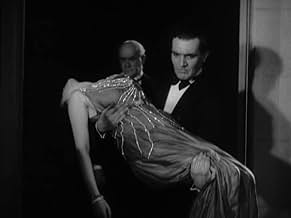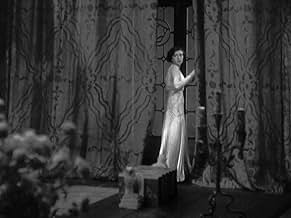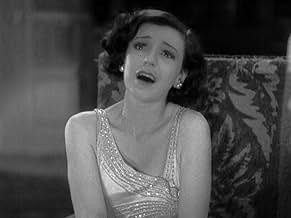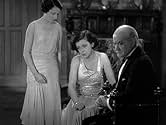IMDb RATING
5.7/10
3.8K
YOUR RATING
An old traditional family and a modern family battle over land in a small English village and almost destroy each other.An old traditional family and a modern family battle over land in a small English village and almost destroy each other.An old traditional family and a modern family battle over land in a small English village and almost destroy each other.
- Director
- Writers
- Stars
Rodney Ackland
- Man at Auction
- (uncredited)
Ivor Barnard
- Man at Auction
- (uncredited)
Wally Patch
- Van Driver
- (uncredited)
- Director
- Writers
- All cast & crew
- Production, box office & more at IMDbPro
Featured reviews
The early 30s were a time of experimentation for Hitchcock, with theme as much as with technique. After discovering that the crime thriller was his forte with Blackmail and Murder!, his at the time zigzagging career lead him to attempt a talkie drama adapted from a fairly mediocre stage play concerning a feud between the families of an aristocrat and an entrepreneur.
In attempting a straight ahead drama without any major thriller elements, Hitchcock nevertheless employs all the techniques he had been perfecting in his earlier crime pictures dynamic editing, a focus on the psychology of guilt and fear, as well as some of the sound techniques of his previous talkies. Sometimes it works, other times it doesn't. He tries to inject some tension into an auction scene with whip pans and quick editing, which is a fairly good display of technique but we don't really care enough about the outcome of the bidding to get really drawn in at this point.
For some of the more talky scenes, Hitchcock tries to move beyond the story's theatrical roots by focusing on reactions and having dialogue take place off screen. This helps to give weight to the second half of the film. In particular, Hitch's dwelling on the face of Chloe, the innocent victim of the feud, makes the audience feel sympathy for her character, which in turn makes the climactic scenes work and prevents them from slipping into ridiculous melodrama (which the stage version may well have done). For some of the more subdued scenes, Hitchcock preserves an unbroken take but still takes the focus on and off different characters by smoothly dollying in and out. This same method would be used by Laurence Olivier when he began directing Shakespeare adaptations in the 1940s. However, too many of the dialogue scenes in The Skin Game are simply a lot of panning as the camera tries to keep up with extravagant theatrical performances.
This is a fairly good go at theatrical drama for Hitchcock, but it was made at a time when he was coming to realise not only his strength in the suspense thriller, but his weakness in (and utter distaste for) every other genre. He was probably beginning to look at this kind of project as a rather dull waste of time, and definitely at odds to his sensibility. As an example, this is one of the very few Hitchcock pictures to take advantage of natural beauty, and yet he makes this aspect a victim of his playful irony, by taking his most beautiful countryside shot, then pulling out to reveal it is merely a tiny picture on a sale poster, surrounded by Hornblower and his cronies laughing over the deal they have just made.
The Skin Game is rarely gripping, but at times it is powerful, and in any case it has a short enough running time to prevent it from getting boring. Hitchcock however was looking now to have more fun with crime and suspense, and this sense of the dramatic (not to mention a sense of genuine sympathy for the victim) would not return until his later Hollywood pictures, and even then only occasionally.
In attempting a straight ahead drama without any major thriller elements, Hitchcock nevertheless employs all the techniques he had been perfecting in his earlier crime pictures dynamic editing, a focus on the psychology of guilt and fear, as well as some of the sound techniques of his previous talkies. Sometimes it works, other times it doesn't. He tries to inject some tension into an auction scene with whip pans and quick editing, which is a fairly good display of technique but we don't really care enough about the outcome of the bidding to get really drawn in at this point.
For some of the more talky scenes, Hitchcock tries to move beyond the story's theatrical roots by focusing on reactions and having dialogue take place off screen. This helps to give weight to the second half of the film. In particular, Hitch's dwelling on the face of Chloe, the innocent victim of the feud, makes the audience feel sympathy for her character, which in turn makes the climactic scenes work and prevents them from slipping into ridiculous melodrama (which the stage version may well have done). For some of the more subdued scenes, Hitchcock preserves an unbroken take but still takes the focus on and off different characters by smoothly dollying in and out. This same method would be used by Laurence Olivier when he began directing Shakespeare adaptations in the 1940s. However, too many of the dialogue scenes in The Skin Game are simply a lot of panning as the camera tries to keep up with extravagant theatrical performances.
This is a fairly good go at theatrical drama for Hitchcock, but it was made at a time when he was coming to realise not only his strength in the suspense thriller, but his weakness in (and utter distaste for) every other genre. He was probably beginning to look at this kind of project as a rather dull waste of time, and definitely at odds to his sensibility. As an example, this is one of the very few Hitchcock pictures to take advantage of natural beauty, and yet he makes this aspect a victim of his playful irony, by taking his most beautiful countryside shot, then pulling out to reveal it is merely a tiny picture on a sale poster, surrounded by Hornblower and his cronies laughing over the deal they have just made.
The Skin Game is rarely gripping, but at times it is powerful, and in any case it has a short enough running time to prevent it from getting boring. Hitchcock however was looking now to have more fun with crime and suspense, and this sense of the dramatic (not to mention a sense of genuine sympathy for the victim) would not return until his later Hollywood pictures, and even then only occasionally.
Technical crudities, print/sound deficiencies and dated acting styles taken into consideration, "Skin Game" still has innovative (for the time) camera techniques and thematic ambiguity (who is right and who is wrong? Who are the true villains of the story?) and is generally better than other, more "typical" Hitchcock films of the period, like "Murder!" from 1930.Edmund Gwenn is terrific and Phyllis Constam is quite sexy. (**1/2)
... but it is an adequate way to explain the dynamic for Americans.
Alfred Hitchcock directs this adaptation of John Galsworthy's play. The moneyed, cultured Hillcrists battle against the nouveau riche Hornblowers, the latter headed by the ambitious, combative patriarch (Edmund Gwenn). Their squabbles over the use of farm land for industrial purposes ends up causing heartache and tragedy for both families. Featuring C. V. France, Helen Haye, and Jill Esmond as the Hillcrists, and John Longden, Phyllis Konstam, and Frank Lawton as the other Hornblowers. With Herbert Ross, Dora Gregory, and Edward Chapman.
This had already been filmed (also with Gwenn) in 1921. The class-conscious storyline resonated well with the British, I suppose. Gwenn plays his role big, and is a stark contrast to his later, best-known Kris Kringle role in Miracle on 34th Street. Jill Esmond, the first wife of Laurence Olivier and originally the bigger star in the marriage, has one of her better film roles. As for Hitchcock's direction, the only stand-out scene is a lengthy auction with a lot of rapid-cut edits.
Alfred Hitchcock directs this adaptation of John Galsworthy's play. The moneyed, cultured Hillcrists battle against the nouveau riche Hornblowers, the latter headed by the ambitious, combative patriarch (Edmund Gwenn). Their squabbles over the use of farm land for industrial purposes ends up causing heartache and tragedy for both families. Featuring C. V. France, Helen Haye, and Jill Esmond as the Hillcrists, and John Longden, Phyllis Konstam, and Frank Lawton as the other Hornblowers. With Herbert Ross, Dora Gregory, and Edward Chapman.
This had already been filmed (also with Gwenn) in 1921. The class-conscious storyline resonated well with the British, I suppose. Gwenn plays his role big, and is a stark contrast to his later, best-known Kris Kringle role in Miracle on 34th Street. Jill Esmond, the first wife of Laurence Olivier and originally the bigger star in the marriage, has one of her better film roles. As for Hitchcock's direction, the only stand-out scene is a lengthy auction with a lot of rapid-cut edits.
....this is good early Hitch! good screenplay,good directing and good acting!Phyllis Konstam is the stand-out .Her portrayal of Chloé can still grab today's audience .
Good scenes:
-the auction sale,twenty-eight years before "North by Norwest" ,is one of the most suspenseful moments of the Master's English era.And there's a brilliant unexpected twist when we think it's over!
-when Chloe takes refuge in her father-in-law's enemy's house,the things seem to have a life of their own:the door,the window,the curtains..
And in 1931,Hitchcock avoids over-simplification:who is good,in the end?who is evil?The local squire and his lady or the arrogant nouveau riche?Who did you have to save?the old couple or the ill-fated Chloé?
In the Truffaut/Hitchcock book,the master says "I did not choose that subject and there is nothing to say about it."
Good scenes:
-the auction sale,twenty-eight years before "North by Norwest" ,is one of the most suspenseful moments of the Master's English era.And there's a brilliant unexpected twist when we think it's over!
-when Chloe takes refuge in her father-in-law's enemy's house,the things seem to have a life of their own:the door,the window,the curtains..
And in 1931,Hitchcock avoids over-simplification:who is good,in the end?who is evil?The local squire and his lady or the arrogant nouveau riche?Who did you have to save?the old couple or the ill-fated Chloé?
In the Truffaut/Hitchcock book,the master says "I did not choose that subject and there is nothing to say about it."
"The Skin Game" is not exactly classic Hitchcock-- no one could dispute that. But I still think it does not entirely deserve its bad ratings. There are a few--not too many, but a few-- interesting scenes and surprises. The characters are fairly sympathetic and well-drawn.
I think the fault of "The Skin Game" lies not in the fact that it is a stage-bound play-- Hitchcock worked wonders on screen with stage-bound plays, notably "Rope" and "Dial M for Murder". Perhaps it is that the emotions of the characters are not focused upon-- the camera keeps rather too distant. If the tone were more personal in this film, the performers might have a better chance to hold our interest.
If you are looking for entertainment and stimulation that one can normally find in a Hitchcock-- better to look somewhere else.
I think the fault of "The Skin Game" lies not in the fact that it is a stage-bound play-- Hitchcock worked wonders on screen with stage-bound plays, notably "Rope" and "Dial M for Murder". Perhaps it is that the emotions of the characters are not focused upon-- the camera keeps rather too distant. If the tone were more personal in this film, the performers might have a better chance to hold our interest.
If you are looking for entertainment and stimulation that one can normally find in a Hitchcock-- better to look somewhere else.
Did you know
- TriviaThe title comes from a slang phrase for "an unscrupulous business operation". Although this movie is British, the term is considered American and dates back to just after the American Civil War (1861-1865). It is not to be confused with the similar-sounding aphorism "to have skin in the game", which refers to someone who has a stake, financial or emotional, in a business deal, wager, or other situation.
- Quotes
[last lines]
Mr. Hillcrist: What is it that gets loose when you start a fight, and makes you what you think you're not? Begin as you may, it ends in this skin game! Skin game! When we began this fight, we'd clean hands. Are they clean now? What's gentility worth if it can't stand fire?
- ConnectionsFeatured in Paul Merton Looks at Alfred Hitchcock (2009)
- SoundtracksHabanera
(1875) (uncredited)
from "Carmen"
Music by Georges Bizet
Libretto by Henri Meilhac and Ludovic Halévy
Excerpt whistled by Jill Esmond
Details
- Release date
- Country of origin
- Language
- Also known as
- Juego sucio
- Filming locations
- Elstree Studios, Borehamwood, Hertfordshire, England, UK(Studio, destroyed during World War II and later rebuilt)
- Production company
- See more company credits at IMDbPro
- Runtime1 hour 25 minutes
- Color
Contribute to this page
Suggest an edit or add missing content




















